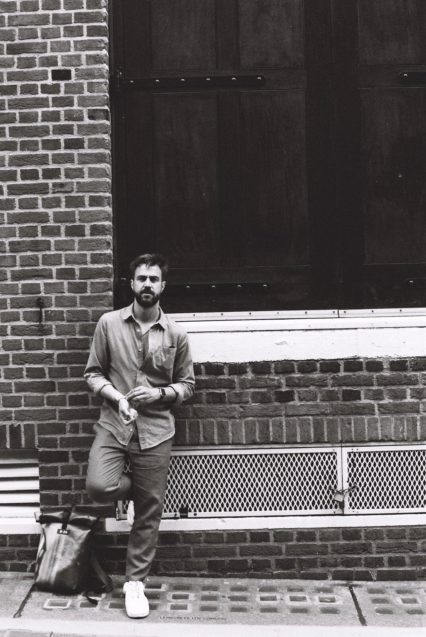Emily Garside reviews Saturday Night Forever, written by Roger Williams as a modern remake of the original set in the 1990s.
Saturday Night Forever is a hangover show. Not one to watch with a hangover (probably the early scenes describing a heavy night out in Cardiff will not help at all) but the kind of show that like a heavy night out returns to you in flashes the next day. It’s a powerful piece full of wit and humour but with a powerful undercurrent that leaves audiences thinking. A deceptively simply seeming piece, delivered in monologue as Lee describes several Saturday nights in Cardiff, Roger Williams’ writing and Delme Thomas’ delivery cuts much deeper.
The play starts with tales of Saturday night in Cardiff. Lee the unwitting accomplice to the repeated epic Saturday nights out favoured by his boyfriend Matthew. While Matthew lives for Saturday night Lee is less interested. Lee describes in detail the ordeal of a Saturday night out in Cardiff, raising a few knowing laughs from the hometown crowd in recognition of the sights and sounds. Bringing to life the “wonder” that is Cardiff on a Saturday night via a monologue, is just one example of Thomas’ masterful performance, inhabiting his tale and the characters along the way expertly. His comic timing describing and reenacting Lee’s legendary Saturday nights, and those they meet along with way is expertly delivered with warmth and wit. The tale itself at this point it hilarious. For anyone who has found themselves in a loud club and wishing they were anywhere else, for those who spend their time nodding along to the music by the bar. Having hot-footed it from my office Christmas party and being mightily relieved to have reviewing duties as an excuse, this part of Lee’s story I could certainly identify with. And for the record I highly recommend an evening watching Saturday Night Forever over any office Christmas party.

It eventually proves one Saturday night too many for Lee. Or more accurately one Take That mega mix too many. And with that the story shifts, first to the post-break-up Saturday nights where Lee spends his evenings alone with only Saturday night TV for company. Then, in a sequence that is like a witty heartwarming rom-com on fast forward, Lee and the audience meet Carl. The anti-Matthew, he and Lee fall for each other at a party one Saturday and the next have a real date. The audience was willing Lee along in first his wild imaginings about what he and Carl might be and then in the real date they finally went on. Sweet and charming things finally fell into place for Lee and all seemed right with Saturday nights again. It’s six months before the audiences joins Lee and Carl again, and all is well on their anniversary (despite some ill-advised Take That themed Karaoke) and the sense of elation when they share an ‘I love you’ is shared by the audience. As is the devastation that follows. A homophobic attack cuts short the happy Saturday nights for Lee and Carl, relayed with heartbreaking detail that shows Delme Thomas’ dexterity as a performer, he conveys the hurt-both physical and mental- with touching subtly telling their story with brutal honesty. When the Take That song returns for its final outing of the show it is quietly devastating.
The piece has been updated from the original set in the 1990s. Indeed, the ubiquitous Take That have formed and re-formed countless times since, making the running motif of their song both amusing and more poignant as its meaning shifts. Across the play other references shift; Blind Date and CD:UK have been replaced by X Factor and Keith Lemon. And while the 90s teenager in me would love to see the original, for sheer nostalgia value, it’s a credit to Roger Williams’ writing that it is so seamlessly updated. Many pieces when ‘updated’ are fully of forced cultural references and a shifting of a character who really still belongs in another era to the present day. Not so with Roger Williams’ skillful writing; Lee is very much of the present, and the references feel real and accurate. Not only to the wider cultural landscape but the careful grounding in the present day geography of Cardiff-particularly tricky when performing to the ‘home’ crowd. In saying all this, there is an element of tragedy that it still feels so relevant. Really we would hope that the kind of attack that Lee and Carl suffer at the end of the play should have been relegated to the kind of thing that ‘doesn’t happen anymore’. Sadly, it is not. This resonates even more with the lines beforehand about marriage-a real possibility for Lee and Carl today-and one of the key signs that many things have changed for gay people in Britain. However the very real possibility that what happens next, a brutal attack simply because someone with a knife doesn’t like who you happen to love? That’s something that should also have to be updated.
I found Saturday Night Forever personally a very powerful piece. Yes, it was funny, and silly at times, and yes with a sprinkle of camp. But it was charming, and romantic without over-emphasis on romance. It felt like a real story, a real kind of love story that everyone could see themselves falling into. But that was wonderful even in its ordinariness. And the ending to Lee and Carl’s story in which simply by being themselves, and loving one another in the most ordinary of ways can lead to tragedy. And that’s a thought to keep in mind long after the Sunday morning hangover has cleared.
Saturday Night Forever
Aberystwyth Arts Centre and Joio
Written by Roger Williams
Directed by Kate Wasserberg
Emily Garside is a regular contributor to Wales Arts Review.












